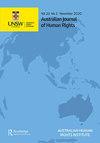Expanding durable solutions for refugees: possibilities for developing education pathways in Australia
Q1 Arts and Humanities
引用次数: 0
Abstract
ABSTRACT As the number of people forced to flee their homes continues to grow each year, traditional legal frameworks for protecting those who move, such as refugee and human rights law, are increasingly under strain. The limited scope of these frameworks, and diminishing political will to implement them, leave countless refugees and other forced migrants with little chance of finding long-term safety and rebuilding their lives. It is increasingly apparent that traditional refugee resettlement programs offered by countries such as Australia are not enough. In this article, we offer a comparative document analysis of the options for developing dedicated higher education migration pathways (education pathways) for refugees as a ‘complement’ to refugee resettlement in Australia. First, we discuss the limited availability of resettlement spaces and higher education opportunities for refugees. Second, we explore complementary ‘education pathways’ as a potential solution to these problems. Third, we critically examine several such pathways already underway in Canada, Mexico and Japan. Lastly, we consider potential models that could be utilised in Australia, and how they would, or could, interact with Australia’s existing humanitarian programs.扩大难民的持久解决方案:在澳大利亚发展教育途径的可能性
随着被迫逃离家园的人数每年持续增长,传统的保护移民的法律框架,如难民法和人权法,正日益面临压力。这些框架的范围有限,执行框架的政治意愿日益减弱,使无数难民和其他被迫移民几乎没有机会找到长期安全和重建生活。越来越明显的是,澳大利亚等国提供的传统难民安置计划是不够的。在这篇文章中,我们提供了一份比较文件分析,为难民开发专门的高等教育移民途径(教育途径),作为澳大利亚难民重新安置的“补充”。首先,我们讨论了难民安置空间和高等教育机会的有限性。其次,我们探索互补的“教育途径”作为这些问题的潜在解决方案。第三,我们批判性地考察了加拿大、墨西哥和日本正在进行的几条这样的途径。最后,我们考虑了可能在澳大利亚使用的潜在模式,以及它们将如何或可能如何与澳大利亚现有的人道主义项目相互作用。
本文章由计算机程序翻译,如有差异,请以英文原文为准。
求助全文
约1分钟内获得全文
求助全文
来源期刊

Australian Journal of Human Rights
Arts and Humanities-History
CiteScore
1.30
自引率
0.00%
发文量
43
期刊介绍:
The Australian Journal of Human Rights (AJHR) is Australia’s first peer reviewed journal devoted exclusively to human rights development in Australia, the Asia-Pacific region and internationally. The journal aims to raise awareness of human rights issues in Australia and the Asia-Pacific region by providing a forum for scholarship and discussion. The AJHR examines legal aspects of human rights, along with associated philosophical, historical, economic and political considerations, across a range of issues, including aboriginal ownership of land, racial discrimination and vilification, human rights in the criminal justice system, children’s rights, homelessness, immigration, asylum and detention, corporate accountability, disability standards and free speech.
 求助内容:
求助内容: 应助结果提醒方式:
应助结果提醒方式:


